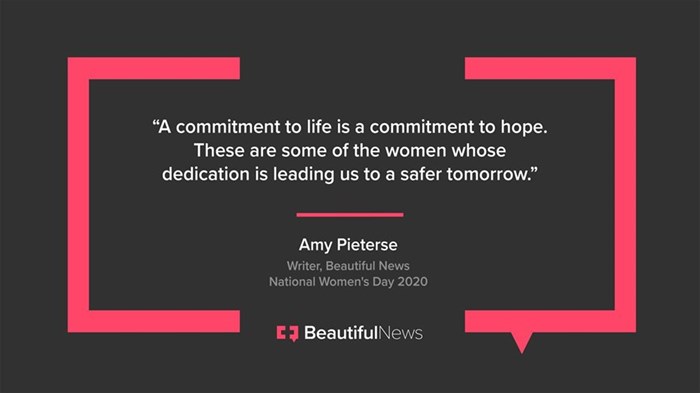
Hope is an action. These are the women leading us forward

In the past year, the pervasiveness of gender-based violence in South Africa took on new urgency as a barrage of murders and assaults occurred. Despair, rage and fear dominated. Facing this terrifying reality, we questioned the way forward. We questioned if there was still hope.
But amid the tragedy are stories we don’t often hear – stories of survival and resilience, of women who are actively confronting this malignant norm. To have hope is to take action, to be disciplined, to persevere. Without it, we have nothing. While we may fall into fatigue and helplessness, the fight must continue. A commitment to life is a commitment to hope. And these are some of the women whose dedication is leading us to a safer tomorrow.
The artist
Lindeka Qampi is silent no more. A survivor of rape, Qampi is shifting the focus onto her life after trauma, freeing herself of the burden of pain. After years of feeling ashamed, the photographer has forged her power from the depths of secrecy. Her self-portraits are a striking confrontation, a visual representation of her healing. The artistic series Inside My Heart is her release. Through singing, poetry, art and photography, Qampi is shattering the narrative of victim-blaming and taking back her story.
She will no longer allow her voice to go unheard. “I use photography as the way of breaking silence for those who are the survivors of rape,” Qampi says. She works with the NPO Inkanyiso, advocating for the protection of the LGBTQIA+ community from sexual violence and murder. Far from living as a victim, Qampi is reclaiming the image of herself, using her camera as a tool for restoration. “I want people to fight for freedom for all,” she says. “We can break the silence.”
The stalwart
Funeka Soldaat has dedicated her life to fighting for justice. A prominent LGBTQIA+ activist, in 1995 she was attacked and raped by men attempting to ‘correct’ her sexuality. Soldaat was disregarded and abandoned by police in the aftermath, and the men who perpetrated this heinous hate crime were never arrested. The injustice spurred Soldaat to take action of her own.
She founded Free Gender in Khayelitsha, an organisation that provides a platform for Black gay women in townships. In a traditional environment where harmful gender norms are enforced, Soldaat’s initiative is not just a safe space, but challenges the beliefs and behaviours that give rise to hate crimes. For the past decade, she has worked to educate people on equality and combat homophobia and violence. “It feels great to make a difference in the community, especially to young people,” she says. Soldaat’s commitment has empowered people to own their strength and take their place in society.
The visionary
After witnessing a man kicking his girlfriend on the street, Lucinda Evans was propelled to act. She intervened, horrified and determined. “I’m just that type of person that could never be a bystander,” she says. Evans recognised the dire need for refuge for women suffering domestic violence. In 2008, she established Philisa Abafazi Bethu, the first initiative of its kind to provide emergency shelter for women and children in immediate danger in the Western Cape.
Evans has not only become a pillar of her community in Lavender Hill, but has led countrywide marches demanding reformation and protection of women. In 2019, she delivered an emotive speech at the #AmINext protests outside Parliament, calling on the government and police to take firmer action against gender-based violence. “Sometimes it’s difficult to bite my tongue for the sake of peace because I always feel it’s much more damaging if I say nothing,” Evans says. “I stand for justice.”
The advocate
When her husband assaulted her, Mandisa Monakali had nowhere to turn. It was 1989, and support for Black women was non-existent. “I realised that something should be done to fight the scourge of violence in the townships,” she says. As one of many women who survived abuse at the hands of a man, Monakali decided to become the person she needed for others.
That same year, she created Ilitha Labantu. In 30 years, the NPO has helped over 50,000 women and children; providing safe houses, support groups and, most significantly, counselling in the person’s mother tongue. Since its beginnings in Gugulethu, it has spread across the country, becoming an essential place of assistance for women in need. The organisation also advocates for policy changes and offers legal support. “Women are power and strength,” Monakali says. “Women are changing the world – and it’s about time that the world should see that.”
Hear their voices. Say their names. Remember their stories. As we mourn the women we’ve lost, we must follow in the footsteps of these leaders. Where there is life, there is hope. These women built the foundations for themselves and others to heal and thrive, and this is the momentum that takes us forward. So join them. Fight. Challenge. Help. Talk. Support. It’s by taking action and remaining committed that we can look towards a future where women and children are valued and protected. Change starts now, and it starts with us.



























